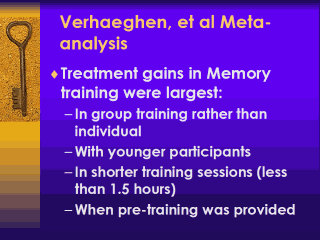 |
Again, when you read this meta-analysis, what it comes down
and says is, everybody is trained for the test, and yet they are showing some incremental
change over time or at least not much decline compared to people that were controlled but
it’s just for the test. It is begging the question “what about real life”. Now they
did say a few other interesting things too; that training done in groups seemed more
useful than individual training; working with younger participates was more effective than
older; using shorter training sessions was more useful. And they theorized that people
just get tired or bored if given too long of a training session. And they ranged
dramatically; there were 20 minute sessions and there were three hour sessions and
everything in between. And he found some studies that showed when pretraining was provided
people improved their treatment gains overall. |
